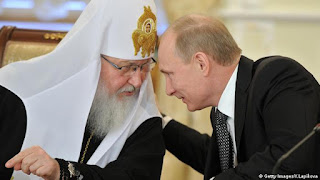Following the demise of the Soviet Union three decades ago, many of us hoped that Russia might embrace democracy and the rule of law and join the larger comity of nations in pursuing international peace and understanding. The odds in favour of this were always rather long, given the country's history and the lack of a supportive political culture. I acquired a paperback copy of the 1993 Constitution of the Russian Federation shortly after it was adopted. One of the introductory essays in this small volume stated unequivocally that this constitution established Russia as a democracy, a claim which even then I thought overly hopeful. In a Russian politics course I once taught, I had my students reading Nicolai N. Petro, The Rebirth of Russian Democracy: An Interpretation of Political Culture. In this 1995 volume, the author argued that, despite its authoritarian political culture, there was a democratic subculture capable of steering Russia in a democratic direction. After Putin came to power at the turn of the millennium and the book's thesis had been overtaken by what I've come to call "putinocracy," I still had my students reading it, because it inadvertently vindicated my own conclusion that deeply-rooted political cultures do not change easily.
For those of us who grew up and reached adulthood during the Soviet era, it appears that Russia, despite casting off the shackles of communism thirty years ago, has reverted rather thoroughly to its former ways, content to be ruled by an autocratic strongman who maintains his power through corruption, intimidation of political opponents, and threats to its smaller neighbours.
Ever since the Grand Principality of Moscow began expanding at the expense of adjacent principalities, Russia has grown continually larger, extending its rule across the vast Eurasian expanse and even into North America. At its height, Russian influence extended into northern California as far as historic Fort Ross. In the run-up to the Great War, Russia made incursions into central Asia, which would become the republics of Kazakhstan, Kyrgyzstan, Tajikistan, Uzbekistan, and Turkmenistan. Thus territorial expansion might be said to have become rather thoroughly rooted in the Russian political culture, which has made Russia both a unifying force over a huge expanse of the continent and a destabilizing force for its neighbours.
Another enduring feature of the Russian political culture is fear of its neighbours, something that is rooted in real historical events, beginning with the Mongol invasions of the 13th century. The Mongol yoke was what prompted Russia's centre of gravity to move from Kiev to the northern forests where Moscow rose to its status of dominance. Given the paucity of geographical features that might constitute natural borders, Russia has been vulnerable to attack from east and west alike. Thus the concern to defend itself paradoxically prompted Russia to attempt to neutralize any possible threats from its neighbours by drawing them into its own sphere of influence and even incorporating them into a greater Russia. This trend reached its zenith in 1945 when Russia effectively occupied a huge swath of land from the Pacific to central Europe as it filled the vacuum left by the defeat of nazi Germany.
What many of us see as Russia's xenophobia is not entirely irrational. Napoleon really did invade Russia in 1812. Imperial Germany invaded during the Great War, effectively ending the tsarist régime. And Hitler invaded Russia in 1941. That these invasions were ultimately unsuccessful in no way lessens ordinary Russians' sense of extreme vulnerability within difficult-to-defend external borders. So, yes, Ukraine poses no realistic threat against Russia. NATO makes no claims on Russian territory, and its member states cannot fathom why Moscow should perceive them as a threat. Ideally, Russia itself could be a member of NATO, bound together with other countries in what might become less an alliance against possible enemies and more a collective security agreement keeping its members at peace with each other.
But there is a third feature of Russia's political culture inextricably connected to the first two. Russians have long fancied themselves to be a singular nation with a special historical role to play in unifying the Eurasian continent. From the Third Rome and Holy Russia to Mother Russia and the homeland of socialism, Russians have seen themselves as a people set apart from the others. Nikolai Berdyaev's The Russian Idea and Solzhenitsyn's The Russian Question at the End of the Twentieth Century represent efforts to define the unique character of the Russian people and to underscore its importance for the world. Perhaps only the United States has a comparable sense of its own historical significance.
 |
| Source: Deutsche Welle |
Like many leaders, Putin faces a population discontented with its standard of living. His popularity soared after the 2014 annexation of Crimea, and he may be looking to repeat this feat by manufacturing a crisis with Ukraine. But his current moves carry a risk for himself and for ordinary Russians. If he can convince enough Russians that Ukraine has caused the crisis, he may succeed in rallying their support, even in the face of western sanctions. However, if economic conditions worsen for them, they may hold him personally responsible, thereby increasing domestic unrest and his own unpopularity.
Although the 1993 Constitution originally limited a president to two consecutive four-year terms, Putin has succeeded in amending it to virtually guarantee that he can remain in power for as long as he wishes. That this can happen so easily makes a mockery of constitutional limits to political power. Nevertheless, the numbers of voting citizens who remember the Soviet era are diminishing with each passing year, and one hopes that the inevitable end of the Putin era will bring to power younger leaders who can take a more modest and realistic view of Russia's place in the world. This is not an impossibility, but it will take some effort to move beyond the constraints of an historically unsupportive political culture.


No comments:
Post a Comment